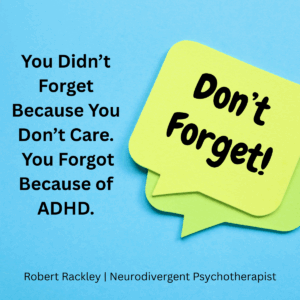“You didn’t forget because you don’t care. You forgot because of ADHD.”
For many adults with ADHD, this simple truth can be life-changing. Too often, forgetfulness is mistaken for laziness, selfishness, or a lack of care. In reality, ADHD impacts how the brain processes, stores, and retrieves information. Forgetting isn’t a character flaw — it’s part of living with a differently wired brain.
Why Forgetfulness Happens in ADHD
ADHD affects the brain’s executive functions — the set of mental skills that help us plan, prioritise, remember, and follow through. Working memory (the brain’s “mental sticky note”) is often weaker, making it harder to hold onto instructions, appointments, or daily tasks.
That’s why someone with ADHD might:
Intend to reply to a message but forget minutes later.
Leave keys in unusual places.
Miss appointments even if they really care about showing up.
Remember the big things but lose track of smaller steps that lead there.
These moments can be deeply frustrating, especially when others misinterpret them as a lack of effort.
The Emotional Impact
The hardest part isn’t always the forgetting itself — it’s the guilt and shame that follows. Many ADHD adults grow up hearing:
“You don’t pay attention.”
“You’re careless.”
“You just need to try harder.”
Over time, these messages stick, creating a painful gap between intention and perception. The truth is, forgetting does not equal not caring.
Practical Strategies for Managing Forgetfulness
While forgetfulness is part of ADHD, there are ways to work with the brain instead of against it:
Externalise memory: Use reminders, alarms, and sticky notes instead of relying on mental recall.
One-step instructions: Break tasks into smaller pieces and tackle one at a time.
Visual cues: Place important items (keys, medication, wallet) in the same visible spot every day.
Compassion first: Remember that forgetting is not a moral failure. Self-kindness reduces the shame that makes ADHD symptoms harder to manage.
Final Thought
If you live with ADHD, forgetfulness doesn’t mean you’re unreliable or uncaring. It means your brain processes information differently. By recognising this — and by creating supportive systems — you can reduce stress and shift the narrative from guilt to understanding.
So next time you forget, remind yourself: It’s ADHD, not a lack of care.
Learn more in my self-paced course, Could I Have ADHD? — designed to help adults understand their ADHD with clarity and confidence.

